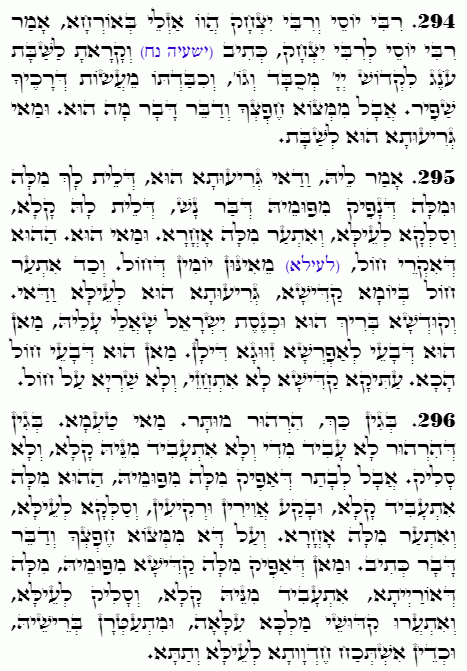Daily Zohar # 4570 – Emor – If you turn away your mouth from the Shabbat
Daily Zohar 4570

Hebrew translation:
295. אָמַר לוֹ, וַדַּאי שֶׁזֶּהוּ חִסָּרוֹן, שֶׁאֵין לְךָ דִּבּוּר וְדִבּוּר שֶׁיּוֹצֵא מִפִּיו שֶׁל אָדָם שֶׁאֵין לוֹ קוֹל, וְעוֹלֶה לְמַעְלָה וּמְעוֹרֵר דִּבּוּר אַחֵר. וּמַה הוּא? אוֹתוֹ שֶׁנִּקְרָא חֹל, (לְמַעְלָה) מֵאוֹתָם יָמִים שֶׁל חֹל וּכְשֶׁמִּתְעוֹרֵר חֹל בְּיוֹם קָדוֹשׁ, וַדַּאי זֶהוּ חִסָּרוֹן לְמַעְלָה, וְהַקָּדוֹשׁ בָּרוּךְ הוּא וּכְנֶסֶת יִשְׂרָאֵל שׁוֹאֲלִים עָלָיו: מִי הוּא שֶׁרוֹצֶה לְהַפְרִיד הַזִּוּוּג שֶׁלָּנוּ? מִי הוּא שֶׁרוֹצֶה חֹל כָּאן? הָעַתִּיק הַקָּדוֹשׁ לֹא נִרְאֶה, וְלֹא שׁוֹרֶה עַל חֹל.
296. מִשּׁוּם כָּךְ הִרְהוּר מֻתָּר. מָה הַטַּעַם? מִשּׁוּם שֶׁהִרְהוּר לֹא עוֹשֶׂה דָבָר וְלֹא נַעֲשֶׂה מִמֶּנּוּ קוֹל, וְלֹא עוֹלֶה. אֲבָל אַחַר שֶׁהוֹצִיא דִבּוּר מִפִּיו, אוֹתוֹ דִבּוּר נַעֲשֶׂה קוֹל, וּבוֹקֵעַ אֲוִירִים וּרְקִיעִים, וְעוֹלֶה לְמַעְלָה וּמְעוֹרֵר דָּבָר אַחֵר, וְעַל כֵּן כָּתוּב מִמְּצוֹא חֶפְצְךָ וְדַבֵּר דָּבָר. וּמִי שֶׁמּוֹצִיא דִבּוּר קָדוֹשׁ מִפִּיו, דְּבַר תּוֹרָה, נַעֲשֶׂה מִמֶּנּוּ קוֹל וְעוֹלֶה לְמַעְלָה, וּמִתְעוֹרְרוֹת קְדֻשּׁוֹת הַמֶּלֶךְ הָעֶלְיוֹן וּמִתְעַטְּרוֹת בְּרֹאשׁוֹ, וְאָז נִמְצֵאת שִׂמְחָה לְמַעְלָה וּלְמַטָּה.
.
Zohar Emor
Continued from previous DZ
#294
Rabbi Yossi and Rabbi Yitzchak were walking along the way. Rabbi Yossi said to Rabbi Yitzchak, “It is written,
Isaiah 58:13
“אִם תָּשִׁיב מִשַּׁבָּת רַגְלֶךָ עֲשׂוֹת חֲפָצֶיךָ בְּיוֹם קָדְשִׁי וְקָרָאתָ לַשַּׁבָּת עֹנֶג לִקְדוֹשׁ יְהוָה מְכֻבָּד וְכִבַּדְתּוֹ מֵעֲשׂוֹת דְּרָכֶיךָ מִמְּצוֹא חֶפְצְךָ וְדַבֵּר דָּבָר.”
“If you turn away your foot from the Shabbat, From doing your pleasure on My holy day, And call the Shabbat a delight, The holy day of YHVH honorable, And shall honor Him, not doing your own ways, Nor finding your own pleasure, Nor speaking your own words,”
This is good. However, ‘finding your own pleasure and speaking idly,’ what does this mean, and how does it detract from the Shabbat if one speaks idly?”
Lesson;
This passage presents a discussion between two sages on the interpretation of Isaiah 58:13-14, where the text instructs on the proper observance of the Shabbat. The focus here is on the part of the verse advising against pursuing personal pleasures and speaking idly on the Shabbat, which are considered actions that might detract from the day’s sanctity and intended spiritual focus. Rabbi Yossi is querying the implications of these prohibitions, seeking to understand how such behaviors might specifically impact the sanctity of the Shabbat.
#295
Rabbi Yitzchak responded, “Indeed, it is a deficiency for the Shabbat because there is no word or utterance that comes from a person’s mouth that does not have a sound, which ascends above and awakens another utterance. And what is it? That is called ‘חול’ (unholy),’ profane.’ For everything that is not holy is profane, from those days that are profane (Weekdays #114). And when profanity is aroused on the sacred day, it indeed constitutes a deficiency above, and the Holy One, Blessed be He, and the Congregation of Israel question about it, asking, ‘Who is it that wants to separate our union? Who is it that necessitates profanity here?’ The ‘עתיקא קדישא’ ‘Ancient Holy One,’ which is Keter, is neither seen nor rests upon the profane.”
Lesson;
This dialogue illuminates the importance that every spoken word has spiritual weight and consequence, particularly on the Shabbat, a day dedicated to spiritual elevation and sanctity. Speaking idle or profane words on the Shabbat is seen as a disruption of the sacred light that appears on that day, potentially interfering with the spiritual union between the Holy One and the Congregation of Israel, representing the collective soul of the Jewish people. The discussion underscores the belief that the Shabbat is a time to abstain from mundane concerns and speech, focusing instead on matters of holiness to maintain and enhance the spiritual connection.
#296
Thoughts are permitted because they do nothing, create no sound, and do not ascend. However, once a person articulates speech from his mouth, that speech becomes sound, breaks through the air and the heavens, and ascends upward, awakening another form of speech, that of the profane. Therefore, it is written, “finding your own pleasure and speaking idly,” but not thoughts. Whoever utters holy speech from his mouth, the speech of the Torah becomes sound from it and ascends above, awakening sacred levels of the Supreme King, namely the holy Sefirot, and they crown his head. Then, joy is found above and below.
Lesson;
This discussion distinguishes between mere thought and spoken words regarding their spiritual impact. Thoughts, being internal and silent, do not have the same effect as spoken words, which have the power to transcend physical boundaries and interact with spiritual realms. When words of Torah and holiness are spoken, they have the power to connect with and activate holy levels (Sefirot), enhancing the sanctity and joy both in the Light of Shabbat and in the physical world. This highlights the power of speech and its pivotal role in spiritual practice and connection.
The bottom line is that one can have thoughts about mundane or weekday actions without expressing them in words. It’s okay to discuss actions related to fulfilling Mitzvot, but it would be better to limit such thoughts and be busy with Torah studies that draw light and ‘charge’ the vessel with light that supports our actions during the weekdays.
{||}

 Previous: Emor
Previous: Emor


